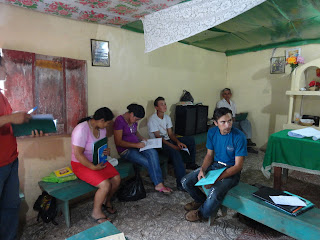Yesterday I went out to the village of El Limón in the Dulce
Nombre parish to facilitate the last of four workshops in different parts of
parish for those who will prepare parents and godparents for the baptism of
children under 7 years of age. It’s a new process and we have new materials
(which I helped write.)
 |
| Catechists at the first workshop, in Agua Buena |
As I’ve done in the earlier workshops I began the workshop,
walking through the rite of baptism – with two parents and two godparents and a
“baby.” In one case we used a statue of the baby Jesús; yesterday we used a
towel – which, at first, provoked lots of giggles from the 31 participants.
The welcoming of the child and the parents and godparents at
the door of the church begins with the question: “What is the name chosen for
the child?”
Timothy Radcliffe has a very good chapter on this in Taking the Plunge: Living Baptism and Confirmation. I won’t try to summarize it.
After the welcoming rite was finished we discussed what had
happened.
I emphasized that the first question is about the name of
the child. The catechists recognized that this is an act of welcoming children
into the community, into the Church.
As I noted, we do not baptize just any “so and so” – “un fulano de tal” in Spanish. The church
baptizes, and calls by name, Jesús, María, Gloria, Ramón, Edelmira, Moisés,
Nelson, Janixa.
This morning, reading the call of the apostles in Matthew
10: 1-7, I noted that Jesus calls the twelve by name. They are not just a mass
of people going out to evangelize. They are Peter, John, Judas, James, and so
on – with their names and personalities.
They have a dignity which is recognized when we call them
by name.
The poor here and in most of the world are without names.
Or, if they are known, they are often despised, ignored, marginalized.
Calling them by name is a way of recognizing their personal
worth as children of God. (That’s why I am quite ashamed of my inability to
remember names.) It is a way to counteract a society that treats the poor as
“nobodies” – or, as a former president of the Honduran Congress once said, “gente del monte,” appropriately
translated as “hillbillies.”
Calling them by name also counteracts the tendency to look
at the poor as a nameless mass of people, to forget that “the poor” are persons
with different personalities, moral character, etc.
And so I’ll try harder to remember names.




No comments:
Post a Comment